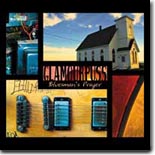 The honest sounding songs on their fifth release, Bluesman's Prayer
(NorthernBlues), draw you to conclude
Glamourpuss is in love with the blues and its lifestyle. The main character
in "Leaving On Sunday" searches for comfort. Ironically, comfort surrounds
you throughout this 52-minute disc.
The honest sounding songs on their fifth release, Bluesman's Prayer
(NorthernBlues), draw you to conclude
Glamourpuss is in love with the blues and its lifestyle. The main character
in "Leaving On Sunday" searches for comfort. Ironically, comfort surrounds
you throughout this 52-minute disc.
Blues/rock guitar makes "Gravel On
The Road" sound tough. In order to accommodate discouraging lyrics about
worlds colliding in a battle of blood and oil, it’s just what the song
requires. The American Dream is questioned on "Street Walker," where a
sharp, cutting guitar liberates a lady of the night. "Tu Peux Cogner"
(loosely translated to You Can Bang) is a Cajun party tune exhibiting an
upbeat accordion and a sweet piano solo.
Precision timed and played lead
guitar features on the retro sounding "Ain’t No News." Road warriors will
relate to "Drivin’ The 401," especially if they’ve driven Canada’s busiest
highway – known as the 'four oh one' – which stretches from Windsor,
Ontario to Montreal, Quebec.
Like a sharpshooter at sundown, Travis
Furlong (guitar) is quick on the draw on "Get Your Own." The rhythm of the
title track is rooted in Mississippi and instantly connects the listener
with the band. The song’s lyrics (“I don’t let nothin’ keep me down /
Lord said to make a joyful sound / When you’re in despair / Just say the
bluesman’s prayer”) will inspire blues fans and blues bands alike.
Although recorded as a loving tribute to Ray Charles, bonus track and
sole cover "Georgia On My Mind" – Furlong and Roger Cormier share most of
the songwriting duties – sounds out of place since it doesn’t enhance
the album.
Glamourpuss is welcoming and inviting without showing off or being
overbearing. Overall, you’ll enjoy riveting songwriting, articulate
guitar, simmering keys, and admirable production.
--- Tim Holek
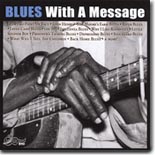 Noted folklorist (and writer of this CD’s liner notes), Paul Oliver
firmly believes there has been a steep decline in blues with a message
since country blues became electrified. Dealing with that period of
transition, Blues With A Message (Arhoolie) focuses on previous material, which was
predominantly recorded in the ’50s and ’60s. 18 artists perform
abandoned songs that address inhumane working conditions, taking
advantage of animals, family concern, politics, the great migration,
Northern jobs, and hope for a better tomorrow.
Noted folklorist (and writer of this CD’s liner notes), Paul Oliver
firmly believes there has been a steep decline in blues with a message
since country blues became electrified. Dealing with that period of
transition, Blues With A Message (Arhoolie) focuses on previous material, which was
predominantly recorded in the ’50s and ’60s. 18 artists perform
abandoned songs that address inhumane working conditions, taking
advantage of animals, family concern, politics, the great migration,
Northern jobs, and hope for a better tomorrow.
Sam Chatman’s protest song confronts the despair of segregation. Modern
society cannot imagine what hopeless conditions produced lyrics like (“I
have to paint my face / so I won’t be kin to that Ethiopian race”). John
Jackson’s guitar is like a loyal friend who supports his acceptance of
integration. Mercy Dee’s lyrics (“With nothing but hard tack and sorghum
to eat”) provide a realistic reflection of a day in the life of a
sharecropper. Her piano blazes while the harp wheezes. At the beginning
of "Tom Moore’s Farm," Mance Lipscomb states “Oh well, he can’t hear me,”
referring to the immoral farmer. The proclamation reflects the fear and
reign Moore had over his repressed workers. Lightning Hopkins echoes
Lipscomb’s sentiments by singing (“he’s the meanest mens I’ve ever
seen”). With the use of a full band, Mississippi Fred McDowell defines
the northern hill music. His view, about being assigned a short-line
mule, is bleak. Like a grand lady of the blues, Essie Jenkins sings
about the epidemic brought on by the Lord in 1919. Willie Eason delivers
a Franklin D. Roosevelt biography. Eason pays particular attention to
the death, and emphasizes the President’s emancipation of
African-Americans.
Mainly featuring songs with only vocals and guitar, these grim
73 minutes will not change the oppressive image of old-fashioned blues.
However, they successfully draw attention that deep and realistic
significance once prevailed in the music. Ironically, these blues became
the influence for modern screeching guitar blues. It is time to return
to the roots, and to stop trying to make the blues mainstream.
--- Tim Holek
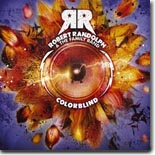 When Robert Randolph was 19-years-old and was leaving his fellow church
members awestruck with his virtuosity on pedal steel guitar during
services, a total stranger gave him a cassette tape during a church
celebration….a tape of Stevie Ray Vaughan. Randolph was impressed at
first listen, and from that point he started seeking out and listening
to other performers like Jimi Hendrix and the Rolling Stones. In
addition, several of Randolph’s uncles once played in a Funkadelic-styled
band, and as a youngster, before he started playing guitar, he longed to
play drums like his uncle.
When Robert Randolph was 19-years-old and was leaving his fellow church
members awestruck with his virtuosity on pedal steel guitar during
services, a total stranger gave him a cassette tape during a church
celebration….a tape of Stevie Ray Vaughan. Randolph was impressed at
first listen, and from that point he started seeking out and listening
to other performers like Jimi Hendrix and the Rolling Stones. In
addition, several of Randolph’s uncles once played in a Funkadelic-styled
band, and as a youngster, before he started playing guitar, he longed to
play drums like his uncle.
Over the past few years, Randolph, with his group The Family Band, has
worked diligently to meld these various genres together into a separate
and unique sound. His latest release, Colorblind (Warner Brothers),
features all those elements, including some of the funkiest grooves
since the days of Sly Stone along with outstanding rock guitar.
The opening cut, “Ain’t Nothing Wrong With That,” is a party number that
kicks things off in grand style. “Deliver Me” rocks even harder like a
long-lost P-Funk single, and “Diane” is a lively love song with a
fantastic horn section. “Angels,” a mellower R&B number, slows things
down a bit and the focus is on Randolph’s inspired pedal steel.
Guitar legend Eric Clapton appears on a blistering remake of the Doobie
Brothers’ “Jesus Is Just Alright,” sharing vocals and contributing
guitar, but great as he is, he can’t hold a candle to Randolph’s
powerhouse attack. Sultry R&B singer Leela James duets with Randolph on
the steamy “Stronger,” and Dave Matthews and Leroi Moore make an
appearance singing backup on the joyous “Love Is The Only Way.”
College football fans will recognize the sizzling “Thrill of It” as the
opening music for ABC’s College Football package this season. “Blessed”
is an uplifting inspirational tune, as is the funky “Thankful N’
Thoughtful.” The closing track, “Homecoming” is a nod to the band’s love
for their music and their fans.
Randolph manages to maintain his roots firmly in gospel and blues,
though the lyrics of some of his songs are becoming more ambiguous with
each release, blurring the line between gospel and secular in an attempt
to reach more listeners. His guitar is like a force of nature, always
heard in the background and swooping and sliding in and out on every
track. The band has also punched up their sound with the addition of
horns on a few tracks, and the Family Band (Danyel Morgan on bass and
vocals, Marcus Randolph on drums, and Jason Crosby on keyboards) lays
down the funk in awesome fashion.
Colorblind is one spectacular ride, and is sure to please anyone in
search of music that’s innovative and entertaining.
--- Graham Clarke
The Miller Brothers Band offer a winning mix of rocking blues and soul
on their debut release, Tales From Foundry Town (Foundry Town Music),
which features 12 original compositions by the band that capture the
flavor of their Midwest background.
The Miller Brothers feature all original songs on their debut release,
and are able to pull it off successfully due to the strength of their
songs and the musical talent of the band members (Dave Miller -
harmonica, guitar, Tommy Miller - bass, Mark Tomorsky - guitar, Bob
Ramsey - keyboards, Frank Charboneaux - drums, Al Jacquez - vocals).
The band has an extraordinary talent for driving rhythms, catchy
melodies and lyrics. “Crazy” sounds like a song you’ve heard before, and
you’ll be humming along with it the first time it‘s played, but it’s an
original. The same applies for other songs, like “Where Do We Go From
Here” and “Out of Control.” “Things Will Get Better” is a modern blues
with some great bluesy guitar licks from Tomorsky, who also shines on “Playin‘.”
The band also specializes in compelling “story songs,” as can be heard
on “Alabama Key,” about a car thief who steals cars using the “Alabama
Key.” “Ghost On A Roll” is a gritty character piece about a homeless
man, and “Pain Comes Your Way“ is about a man trying to outrun a broken
heart.
Mark Tomorsky and Dave Miller provide excellent work on guitar and
harmonica respectively while Ramsey’s keyboards provide a dazzling lift
to several of the songs. Bassist Tommy Miller and drummer Charboneaux
provide rock-steady backing, and singer Al Jacquez’s powerful vocals are
the perfect compliment to the material.
The Miller Brothers Band’s sound will appeal to a lot of listeners.
Tales From Foundry Town features equal measures of riveting blues, soul,
rock, and even pop – providing convincing proof that the band has a
bright future.
--- Graham Clarke
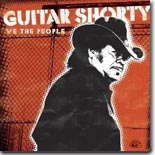 It worked for me to throw Guitar Shorty’s latest record, We
the People, on the CD player at work and hit the elliptical trainer
for half an hour. His guitar assault kept me focused on the task at hand
and before I knew it, 30 minutes was in the bag. We the People is
an energetic record that pulls no punches and continues Shorty’s
standard of excellence on Alligator Records.
It worked for me to throw Guitar Shorty’s latest record, We
the People, on the CD player at work and hit the elliptical trainer
for half an hour. His guitar assault kept me focused on the task at hand
and before I knew it, 30 minutes was in the bag. We the People is
an energetic record that pulls no punches and continues Shorty’s
standard of excellence on Alligator Records.
The title cut opens with Shorty lamenting the cause of the common
people. “Just don’t seem right, that today a poor man got to sacrifice,
just to pay the bills cause money’s tight…when you’re just the people.”
Government is supposed to work for everyone, not just the rich and in
the end, the poor man suffers. “What Good is Life” finds Shorty
pondering the future of his current relationship. “What good is life
without good loving…no good at all. If I don’t have good loving….I don’t
want to live…I need someone who wants to give…give...give.” Shorty’s
come home after a hard day’s work, his woman’s in her nightgown,
dinner’s not cooked and the house isn’t clean. “I want this thing to
last but what good is it if I keep kissing your ass?” No good at all!!!
Shorty’s guitar work opens the next track, “I Got Your Number.” “I got
your number and it’s 666.” It seems the mystery woman isn’t all she
portends and Shorty’s immediately wise to her moves. “I heard a lot
about you…I said it wasn’t true…but your bad reputation came shining
through!” Bad luck in love continues on “Runaway Train.” “Clear my
head...focus my eyes…trying to get that woman...out of my mind…that
woman hit me like a runaway train!!” A blistering guitar solo emphasizes
the pain that this woman has caused Shorty and you know he’s glad she’s
gone.
Tempo slows and the soulful notes of Shorty’s guitar begin the intro to
the ballad, “Down That Road Again.” “You’ve got everything to lose…and
not one single thing to gain…so be careful what you choose…you might
open up a whole world of pain…you’ve got to help yourself …or you’ll
walk down that same road again.” Love is never easy but here’s hoping he
made a wise choice. We’re going up tempo next and taking a ride in that
“Fine Cadillac.” “You got a dead battery…I’m going to charge it for
you…a flat tire….I’ll change that too!” As long as she moves over and
let’s Shorty drive...everything will turn out fine. “It’s just a fine
driver that you lack…let me take the wheel of that Cadillac!”
“Can’t Get Enough” finds Shorty in hot pursuit of a woman he’s been
after for a long time. “Now you can’t get enough…yea you like my
stuff…because I got what it takes… to make you give it up…now I’m
slipping and sliding and riding in the midnight with you!” This is one
hot woman and for once we find Shorty a happy man. Despair returns in “A
Hurt So Old.” “I got your letter baby…and I’ve been thinking about you
too…it’s been 17 years and not much in life does what you think it will
do…but how can a hurt so old still feel so new?”
Betrayal doesn’t seem to matter when Shorty sings, “Who Needs It?”
“You’ve been unfaithful one time too…who needs a woman who acts like
you…who needs it? I do” Obviously her charms have Shorty under a spell
that he can’t seem to get away from. Who needs it? He does.
Shorty goes back to his roots on “Blues in My Blood.” “I was born in
Texas…in the Lone Star State…way back in 39 I got my first break.
Teacher said to me, “What you going to do?” I said my name’s Guitar
Shorty and I’m going to play the blues!”
“Cost of Living’” finds Shorty again pondering the fate of the common
man. “There was that old lady…who lived in a shoe…had so many bills…she
didn’t know what to do….the credit card company came…came to take her
laces away…cause she couldn’t pay. The cost of living is raising the
dead…making ends meet is over her head…so high in the sky…whose to
blame…when our wages stay the same?” Times are getting tougher and the
solutions to the problem are not easily found. “Sonic Boom” closes out
what has been a very energetic set of music from Shorty. “Hey little
girl I can bring the rain…lift you up like a hurricane…when I get to
you…like a sonic boom!”
Guitar Shorty has definitely found his stride with his recorded work for
Alligator. The vocals are fresh, the guitar playing as blistering as
ever and the end result is a solid blues record. Throw it in the CD
player, turn it up loud and if you’re not going to do any cardio…at
least breathe heavily while you enjoy We the People.
--- Kyle Deibler
I have to admit I was a bit
surprised when I received the latest offering from Delta Groove
Productions in the mail for review. I’d not seen the Jackie Payne /
Steve Edmonson Band perform for a couple of years now, and their
appearance on the Delta Groove label was a bit puzzling. But as I read
Randy Chortkoff’s comments in the liner notes, it became apparent that
Randy’s decision-making process in signing artists is similar to my
approach to reviewing records. We’re both the happiest when the artist
and their material manage to find a way to touch our musical souls;
after that, the decision is easy. So while the release of Master of
the Game takes the listener “down Funk Avenue and deep into
Soulsville,” it’s a worthy addition to the Delta Groove Family.
The upbeat “Mean Evil Woman” opens up the set and Jackie lets you know
that he’s met his match. “She keeps that gumbo simmering in the pot…I
wonder if that’s why her loving is so doggone hot…I’d like to be her
only man if I could…but she’s a mean evil woman…don’t mean a man no
good.” Sounds like Jackie’s found more than he can handle. “Master of
the Game” continues Jackie’s trek at being unlucky in love. Steve
Edmonson’s guitar fills provide the perfect foil to Jackie’s woes. “My
baby’s gone…she took the midnight train…when it comes to waiting at the
station…Lord, I’m the master of the game!” Just another love gone bad.
“Let me talk to you baby and tell just how I feel” sings Jackie as he
lets his woman know she’s “The Real Deal.” He’s finally found a good
woman whose loving he appreciates. Carl Green’s sax work highlights “The
Real Deal” and lets you know that the band has been together for awhile
now to be this tight. Things slow way down on the lovely ballad, “A Fool
Named Me.” “Losing your love was a terrible pain…I never want to feel
this hurt again…if you can only find it in your heart...come on back
home and make a brand new start….blame it on the nights I couldn’t
sleep…blame it on the demons in my sleep…blame it on the fool named me.”
This is classic soul at its best and a wonderful original tune.
The pace picks back up on “Woman in Kansas City.” “I’ve got a woman in
Kansas City…do anything for me…she’d sell her soul to the devil to keep
him away from me.” Jackie’s got a good woman there who he just doesn’t
see enough of but she loves him anyway. I hear John Middleton on trumpet
and can’t help but appreciate the tight musicianship of the entire band
as they back Jackie’s vocals. We’re staying funky on “Sweet Landlady”.
“I got a sweet landlady…love to pay my rent on time…you see she takes
her rent out in trade…old boy don’t have to spend a dime.” Jackie’s
always got a place to stay as long as he can keep the landlady happy!
“Black Cat Roun’ My Do’” finds Jackie afraid of the bad omens that a
black cat brings. “Ever since that cat found another home…my luck’s been
so doggone hard…I’m moving in the morning cause the black cat keeps
hanging round my door!” Cynthia Manley and Jessica Williams provide the
background vocals that echo Jackie’s misery at having such bad luck.
“Fly me once around the city…so I can see that Golden Gate” sings Jackie
in “Wake Me Up in San Francisco”. “I’ve got a lovely lady in
Oakland…right across that Bay Bridge is where I need to go.” This is a
good woman and Jackie’s vocals lets you know the love he’s feeling is
real. He’s happy to be back in the Bay Area with this good woman.
Up next is the classic, “A Nickel and a Nail,” and it showcases the
soulful range of Jackie’s voice. This is one of four covers on the CD
and it’s given the just due it deserves by Jackie and the band. Just a
wonderful cover of this classic song. “Sweet you, sweet you…no one else
will ever do…you’re just the one I’ve been looking for” sings Jackie on
“Just the One.” Written by Stephen Cropper, “Just the One” is another
astute choice for Master of the Game.
Bill Singletary’s bass intro brings us to “Warm Rain Fallin'.” “It was a
warm rain fallin' on my baby’s face…the day I left she told me…no one
could ever take my place.” “It’s a strong…strong feeling rockin' in your
loving arms…oh baby…but like the warm rain falling…comes the dawn and
I’ll be gone.” “Warm Rain Fallin” is a heartfelt ballad and my favorite
cut on the record.
The band cuts loose on Steve Edmonson’s original instrumental
composition, “Cabranito” and it’s here that you know that this is a band
that’s spent a long time on the road together. The sound is tight,
everything in its place and you appreciate the instinctive feel for each
other that is evident. The cd closes with the band’s version of “I’ll
Take Care of You” and the haunting sax work by Carl Green sets the tone
for Jackie’s vocals as he lets his woman know “you won’t ever have to
worry baby and you wont ever have to cry…cause I’ll be right there
beside you…to dry your weepin eyes…I’ll take care of you!”
Master of the Game reflects the abilities of a wonderful group of
musicians whose time on the road together has been well spent. I
particularly enjoyed Jackie’s vocals on the ballads, “The Real Deal”,
“Wake Me Up in San Francisco”, “Warm Rain Fallin” and “I’ll Take Care of
You”. These are classic performances that harken back to the era of Stax
and Hi records with wonderfully passionate stylings by a performer and
band that know their way around “Soulsville.” It’s not blues in the
tradition we’ve come to expect from Delta Groove, but Master of the Game
is a soulful record that will warm your heart.
--- Kyle Deibler
 "The Killer" is back! Actually,
Jerry Lee Lewis never left us,
although it sometimes seems a miracle that he's still around
considering his excessive lifestyle and the number of near-death
experiences. The title of his new CD, Last Man Standing (Shangri
La Entertainment), is thus quite appropriate. From a musical standpoint,
Jerry Lee has aged amazing well. At 71, his voice and piano playing
sound as fresh and invigorated as it did more than 40 years ago. His
style hasn't changed much over the years (why should it?!), so there's
nothing new and innovative here.
"The Killer" is back! Actually,
Jerry Lee Lewis never left us,
although it sometimes seems a miracle that he's still around
considering his excessive lifestyle and the number of near-death
experiences. The title of his new CD, Last Man Standing (Shangri
La Entertainment), is thus quite appropriate. From a musical standpoint,
Jerry Lee has aged amazing well. At 71, his voice and piano playing
sound as fresh and invigorated as it did more than 40 years ago. His
style hasn't changed much over the years (why should it?!), so there's
nothing new and innovative here.
The gimmick behind Last Man Standing is that the 21 cuts all
feature duets with an incredible array of rock 'n' roll, blues and
country stars. And what a lineup! They all deserve mention, so here we
go: Jimmy Page, B.B. King, Bruce Springsteen, Mick Jagger, Ronnie Wood,
Neil Young, Robbie Robertson, John Fogerty, Keith Richards, Ringo Starr,
Merle Haggard, Kid Rock, Rod Stewart, George Jones, Willie Nelson, Toby
Keith, Eric Clapton, Little Richard, Delaney Bramlett, Buddy Guy, Don
Henley and Kris Kristofferson.
The material here serves as a microcosm of Lewis' career, starting out
with more of a rockabilly sound and moving more into honky tonk on the
later cuts.
Among my favorite duets are the rockin' "Sweet Little 16," with Ringo
Starr, the elegant "Twilight", with Robbie Robertson, the slow blues of
"Trouble In Mind," with Eric Clapton, and the frenetic "Hadacol Boogie,"
with Buddy Guy. The latter pairs the two artists that generally know no
limits to excess in their music, but they give each other enough space
to get wild during the song.
While Lewis' voice belies his years, Rod Stewart sounds like an
octogenarian on their version of "What's Made Milwaukee Famous." His
raspy voice now sounds aged.
The CD ends with a very nice duet with Kris Kristofferson on the
latter's "The Pilgrim Ch. 33." I recall receiving a detailed analysis of
this song's lyrics during my freshman English class 35 years ago this
fall, so this number obviously brought back a lot of personal memories.
Is this the definitive Jerry Lee Lewis CD? Absolutely not! But it's a
fun ride and a good chance to hear one of rock 'n' roll's pioneers share
the studio with other musical legends.
--- Bill Mitchell
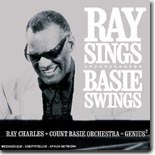 The release of Ray Charles' Ray Sings, Basie Swings
(Concord Records) is sure to generate mixed feelings about the concept
behind this disk. Brother Ray never performed with Count Basie's
orchestra, although he was very fond of Basie's music and once
collaborated with several members of the orchestra on a studio
recording. The vocals on this CD were extracted from a mid-'70s live
appearance on which Charles' vocals were crystal clear but the
accompaniment of his regular band were muffled. So Concord took the
vocals and laid them over fresh arrangements of the songs by the present
day Basie orchestra.
The release of Ray Charles' Ray Sings, Basie Swings
(Concord Records) is sure to generate mixed feelings about the concept
behind this disk. Brother Ray never performed with Count Basie's
orchestra, although he was very fond of Basie's music and once
collaborated with several members of the orchestra on a studio
recording. The vocals on this CD were extracted from a mid-'70s live
appearance on which Charles' vocals were crystal clear but the
accompaniment of his regular band were muffled. So Concord took the
vocals and laid them over fresh arrangements of the songs by the present
day Basie orchestra.
Whether or not one approves of this computer age digital manipulation,
there's no denying that this is a well-done album with marvelous vocals
from Ray. Charles truly deserved the label "The Genius"; there's no song
that he couldn't take and put his stamp on it. Witness the opening
number, "Oh, What A Beautiful Morning," which Charles takes a simple,
schmaltzy ditty and turns it into a soulful anthem.
This pseudo marriage of Charles and Basie sounds natural on Louis
Jordan's Let the Good Times Roll," a jump blues that cries out for the
big band arrangement.
Other Ray Charles classics include versions of "Busted," "I Can't Stop
Loving You," "Feel So Bad," and the classic "Georgia on My Mind."
Personally, I don't necessarily approve of this kind of thing, as it
opens the door for all kinds of abominations. The liner notes for this
CD even cite Kenny G's "duet" with Louis Armstrong as an example of
"musical necrophilia." But it works here, and gives us all a chance to
hear live Ray Charles recordings that otherwise would have been
unissued.
--- Bill Mitchell
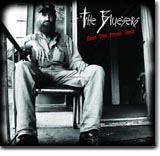 From Toronto, a hotbed of musical releases lately, comes The Bluesers,
comprised of almost a single, and as far as we can tell immediate,
family. Notable is the wide range of ages, but not enough to be trivial.
The results of preservation and continuing interest has made the
pleasures of blues performance available to people of just about all
ages, races, creeds, colors. To see the photos of Chris Cotton, lead
guitar, John Cotton on bass and drummer Mike Cotton Jr. striking a pose
or playing their instruments, it’s clear many people express blues
today.
From Toronto, a hotbed of musical releases lately, comes The Bluesers,
comprised of almost a single, and as far as we can tell immediate,
family. Notable is the wide range of ages, but not enough to be trivial.
The results of preservation and continuing interest has made the
pleasures of blues performance available to people of just about all
ages, races, creeds, colors. To see the photos of Chris Cotton, lead
guitar, John Cotton on bass and drummer Mike Cotton Jr. striking a pose
or playing their instruments, it’s clear many people express blues
today.
All material on their disc Shut The Front Door is original. Chris
was age 13 during recording and was the youngest performer at the 2006
International Blues Competition in Memphis, as well as the North By
Northeast Showcase. The hot guitarist was also written up in the Toronto
Star after he opened for Dr. John and Phil Guy at the ‘05 Windsor Blues
Fest. He’s a vocalist too, but not listed as such on this disc.
Add to the Cotton clan Mike Branton, who apparently organized the band.
He plays second rhythm guitar and is in excellent voice as the sole
vocalist. Finally there’s “Alex” Hagopian’s harmonica. His playing is
technically dazzling, as is the budding lead guitarist Chris Cotton,
while drummer Mike Cotton Jr. sounds quite mature. But there is overplay
in some places, inadequate groove in others, overriding what only
seasoned experience provides. For what is probably patriarchal credit,
the CD is dedicated to the memory of John H. Cotton. For other assumed
leading family figures, let’s imagine the curmudgeon pictured on the
cover, but a better bet would be the proud-yet-humble appearing John
Cotton presiding over the younger players on the back.
The recording sounds homemade, which is a soulful positive in blues
character. Instrumentation is definitely urban, the variety of tempos,
rhythms (including two-beat and funk) and chord structure are a good
mix. The opening track, “It’s A Pity,” is being distributed as a single
for radio. A technical glitch seems to have duplicated track four again
as track eight, with only seven on the playlist. Two tracks are
standouts, the calypso “Harder Look At You” and slow Hendrix-ish “By
Your Bedside,” and earn a B+ individually. Overall the CD feels B-. For
more go to
www.thebluesers.com
--- Tom Coulson
Broadcaster/musician
Contact: mailto:tcoulson@ktar.com
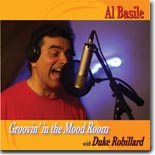 The Mood Room is Duke Robillard’s own studio in Pawtucket RI. If you
don’t know Duke, just refer to any of the thousands of items a search
engine could provide, including dozens within the issues of Blues Bytes,
then get back with us. Suffice it to say, Robillard has probably
produced, or has been guitarist on, many more CDs than his own.
The Mood Room is Duke Robillard’s own studio in Pawtucket RI. If you
don’t know Duke, just refer to any of the thousands of items a search
engine could provide, including dozens within the issues of Blues Bytes,
then get back with us. Suffice it to say, Robillard has probably
produced, or has been guitarist on, many more CDs than his own.
Groovin' In The Mood Room (Sweetspot Records) introduces Al
Basile to some of us. He is a writer/vocalist who performs. Ruth
Brown recorded his “Bite My Tongue” in ‘97. He plays cornet (was with
the original Roomful Of Blues), performs jazz and blues with the group
“Swing N’ Strings” in New England and is a poet. See and hear samples of
his work on
www.albasile.com. He has 35 years in the business, has been a
collaborator with Robillard that long, and recently retired from formal
teaching.
Groovin' In The Mood Room is Basile’s fifth album. His is an
interesting, durable voice, Bon Scott meets Dr. Hook? His writing really
is modern blues, stories and experiences conspire with the teacher still
in him resulting in a style mirroring the classic R & B writers and
performers he grew up with. If his tunes were instrumental they’d still
inspire with feeling. On slower numbers his vocal phrasing is somewhat
tenuous, a drift off-pitch is noticeable elsewhere, but that is the case
with most any writer who also performs.
The fare begins with chord structures Bessie Smith or Billie Holiday
might have sung over, then thru late ‘50s rock ‘n roll, passenger
travel, New England’s answer to mojo and the conquer root, and of course
lost love in “Your Turn To Pay.” Basile uses Doc Pomus’ songwriting as
inspiration for “Baby Sister.” “I’m In A Mood” has what sounds like
tremolo guitar, but it’s explained as “backward guitar,” as in the old
analog tape in reverse against another forward track. Al used the names
of George Martin and Jimi Hendrix as examples in the notes, then
admitted the tune was really inspired by Roy Milton!
“The Show Must Go On” is jazzy with a hip backbeat. “Your Rights” may
have the most country, even commercial potential of the outing --- on
it, Robillard takes his first-ever piano solo and plays dobro guitar.
“Take My Word For It” has a slight Ben E. King quality. The balance of
the program has titles that already set up the themes, like “Be A
Woman,” ballad-like with Hammond B3 organ. “Coffee And Cadillacs” is
lazy and fuzz-guitar heavy Chuck Berry, the closing “You Satisfy” has
Robillard singing harmony with leader Basile. It’s as warm in delivery,
as the whole album is warm in sound quality. A mood room indeed. Easily
a grade of B.
Duke Robillard as a guitarist ranks with the heaviest of rockers, but he
and his cohorts are much more sympathetic in feeling and groove. This
makes him a cult figure in blues circles at the expense of public
popularity. He is highly successful at getting the right sound for each
project, and this Al Basile recording is a great example. In fact, this
release is even more solid than the myriad Robillard has done for
Canada’s Stony Plane label with many artists over the past three years,
all of which are good as well.
--- Tom Coulson
Broadcaster/musician
Contact: mailto:tcoulson@ktar.com
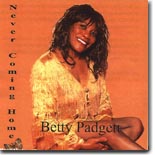 Never
Coming Home (Meia Record), from Betty Padgett, is a real
find, one of those independent releases that have that limited
underground Southern soul appeal from a singer I first heard in the
early '80s. It is a release that should be made available on a major
label so that mainstream listeners would have a chance to hear her, too.
Perhaps with the increasing popularity of Internet radio, more releases
like this will be heard by a new and larger audience.
Never
Coming Home (Meia Record), from Betty Padgett, is a real
find, one of those independent releases that have that limited
underground Southern soul appeal from a singer I first heard in the
early '80s. It is a release that should be made available on a major
label so that mainstream listeners would have a chance to hear her, too.
Perhaps with the increasing popularity of Internet radio, more releases
like this will be heard by a new and larger audience.
Betty's singing career began in Florida, and in 1981 she released her
first LP, "Sweet Feeling." It got some local air play and allowed her to
tour with such T.K. artists such as Latimore, David Hudson and Jimmy Bo
Horne. In the early '90s she sang with Phoenix favorite Joey Gilmore
(also from Florida). If I had to choose a singer she most reminds me of,
it would be Gwen McCrae. Perhaps it was all that time with these Miami
artists, but the resemblance to Gwen is quite amazing. Now if Betty had
only hooked up with Henry Stone?? Perhaps it's not too late in light of
the new album he just did with McCrae.
1998's 30 Second Man was a 30-second hit and her album passed
unnoticed. In 2004 she released the fine "Closet Lover" with its classy
cover of Ann Peebles' "99 Lbs." Along with Jimmy Lewis' "Getting What I
Want," they made it her strongest release to date.
That brings us to her newest and best release so far. Never Coming
Home is a representative contemporary Southern soul release. Its
title track is a classic to stand along with the best of '....you
cheated, you got caught and now I'm leaving' songs. She tells her ex
that all those years she worked enabled her to buy a better house and a
better car, and when she turns the key in her lock nobody's getting in
but her. It's a great track with its hip spoken lines laying out the
truth to that loser. This is the kind of track we love to find after
listening to piles of worthless releases with absolutely no redeeming
qualities or songs.
Other tracks such as the opening "Sneaking Around" will stick in your
mind as will the upbeat dancers such as "Bounce" and "Check Yourself"
which add to the diversity of this fine release.
Never Coming Home is another one to add to your upcoming
Christmas list. It won't be one that folks will find on their own. Four
deep bows to Betty and her great new release.
--- Alan Shutro
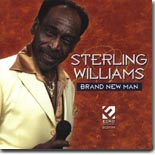 On
Sterling Williams' Brand New Man, Ecko Records definitely
has a winner in the opening track, "Dirty Woman," a duet between
Williams and Morris J. It's the kind of track that will infiltrate the
playlists of Southern soul DJs and be heard from this day forward. It
will follow in the footsteps of his song "Grade A Quality," still
getting plays since 1995.
On
Sterling Williams' Brand New Man, Ecko Records definitely
has a winner in the opening track, "Dirty Woman," a duet between
Williams and Morris J. It's the kind of track that will infiltrate the
playlists of Southern soul DJs and be heard from this day forward. It
will follow in the footsteps of his song "Grade A Quality," still
getting plays since 1995.
Williams was born in Bryan, Texas in 1955, but was last known living in
California. He was a baker by trade, and musically came through church
and the chitlin' circuit. His first single, under the name of Frankie
Jensen, came out in the late '60s, produced by none other than John
Richbourg. He worked in California with Mary Love and Sonny Green in the
'80s. His first CD, One Day At A Time, from which the
aforementioned single "Grade A Quality" came, was released on Everready
Records, Williams' own label.
Now let's jump ahead ten years and here we are at Ecko Records, a major
player on the chitlin' circuit (ironically for ten years also) adding
Sterling Williams to their already impressive roster. Many of the tracks
follow once again in Ecko's formularized programming, but as a soul guru
once said..."If it ain't broken, don't fix it." In all fairness, this
release has some help from Jim Spake on tenor sax and James Jackson on
keyboards. O.B. Buchana guests on background vocals.
There's a real good version of "You've Got A Booger Bear Under There,"
originally recorded for Ecko by Ollie Nightingale, and a topical "In The
Ghetto" (not Elvis' I.T.G.), about drugs and death in the neighborhood.
Another favorite track is the bluesy "Heartache Medicine," with John
Ward adding his little blues guitar runs and Sterling's voice sounding
strong and assured.
Another quality release for Ecko with lots of potential and the ability
to get Sterling Williams some of the recognition he deserves.
--- Alan Shutro